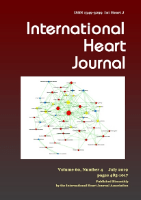
International Heart Journal
Scope & Guideline
Elevating Understanding of Heart Disease Worldwide
Introduction
Aims and Scopes
- Cardiovascular Physiology and Pathophysiology:
Research on the underlying mechanisms of cardiovascular diseases, including studies on heart function, vascular biology, and the effects of systemic conditions on cardiac health. - Clinical Cardiology and Interventional Procedures:
Focus on clinical studies related to heart diseases, including management strategies, surgical interventions, and the application of emerging technologies in cardiology. - Cardiac Biomarkers and Diagnostics:
Exploration of novel biomarkers for diagnosing and prognosticating cardiovascular diseases, including studies on blood tests, imaging techniques, and electrophysiological assessments. - Heart Failure and Arrhythmias:
In-depth studies on the epidemiology, treatment, and outcomes of heart failure and arrhythmias, aiming to improve patient care and management strategies. - Preventive Cardiology and Public Health:
Research dedicated to understanding risk factors for cardiovascular diseases and the effectiveness of preventive measures, including lifestyle modifications and public health initiatives. - Genetics and Molecular Cardiology:
Investigation into the genetic basis of cardiovascular diseases and the role of molecular mechanisms in disease progression and response to therapy.
Trending and Emerging
- Artificial Intelligence and Machine Learning in Cardiology:
There is a rising interest in the application of AI and machine learning techniques for diagnosing cardiovascular conditions and predicting patient outcomes, enhancing personalized medicine. - Telemedicine and Remote Monitoring:
The publication of studies on the efficacy of telehealth and remote monitoring systems has surged, particularly in the context of managing chronic cardiovascular diseases and improving patient accessibility to care. - Personalized and Precision Medicine Approaches:
Research focusing on tailoring cardiovascular treatments based on individual genetic, phenotypic, and environmental factors is gaining momentum, paving the way for more effective interventions. - Integrative Approaches to Cardiovascular Health:
An increase in studies that combine lifestyle interventions, psychological aspects, and social determinants of health into cardiovascular care is noted, reflecting a holistic view of patient management. - Emerging Therapies and Novel Drug Developments:
There is a growing emphasis on research related to new pharmacological agents and innovative therapeutic strategies, such as gene therapy and regenerative medicine, to manage cardiovascular diseases.
Declining or Waning
- Traditional Risk Factor Studies:
There has been a noticeable decrease in studies solely focusing on traditional cardiovascular risk factors such as hypertension and hyperlipidemia, as research increasingly emphasizes integrated approaches to cardiovascular health. - Basic Science Research Unrelated to Clinical Application:
Basic science studies that do not have clear clinical implications are becoming less common, with a shift towards translational research that connects laboratory findings to patient care. - Single-Center Studies with Limited Generalizability:
The prevalence of single-center studies is declining as the field moves towards multicenter collaborations that provide more robust data applicable to wider populations. - Outdated Treatment Protocols:
Research focusing on older treatment protocols is becoming less prominent, as the field advances towards novel therapies and updated guidelines based on recent clinical trials.
Similar Journals

HEART AND VESSELS
Championing Excellence in Heart and Vascular ResearchHEART AND VESSELS is a prominent peer-reviewed journal published by SPRINGER, dedicated to advancing the fields of cardiology and cardiovascular medicine. With its ISSN 0910-8327 and E-ISSN 1615-2573, this esteemed journal encompasses a broad range of topics pertinent to heart health, vascular function, and associated therapies, making it an essential resource for researchers, clinicians, and healthcare professionals alike. Based in Japan and operating since 1985, HEART AND VESSELS has consistently maintained a Q2 ranking in the 2023 category quartiles, highlighting its relevance and impact in the cardio domain. Although it does not offer open access, the journal ensures high-quality publications that contribute significantly to the academic and clinical understanding of cardiovascular health. With over three decades of continuous scholarly contribution, HEART AND VESSELS serves as a vital platform for disseminating cutting-edge research and fostering innovative practices in the management of cardiovascular diseases.

Nepalese Heart Journal
Fostering Scientific Discourse in CardiologyNepalese Heart Journal, published by the CARDIAC SOC NEPAL, serves as a premier platform for disseminating knowledge in the field of cardiology and cardiovascular health. With an ISSN of 2091-2978, this journal aims to bridge the gap between researchers, clinicians, and academicians by presenting high-quality, peer-reviewed articles that address clinical practices, innovative research, and emerging trends in heart disease management, especially within the context of Nepal and the surrounding region. Although it operates under a traditional publishing model, its commitment to excellence aids in reinforcing the scientific discourse in an area critical to public health. The journal is a valuable resource for professionals and students alike who are focused on advancing their understanding of cardiology and its implications for health policy and practice. Exploring the intersections of local challenges and global advancements in heart health, the Nepalese Heart Journal is poised to contribute meaningfully to the evolving landscape of cardiovascular research.
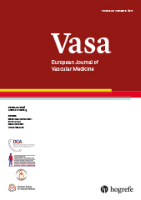
Vasa-European Journal of Vascular Medicine
Exploring the Frontiers of Vascular Medicine TogetherVasa - European Journal of Vascular Medicine is a leading peer-reviewed journal dedicated to advancing the field of vascular medicine, published by HOGREFE AG in Switzerland. With a proud history dating back to 1972, this journal serves as a critical platform for researchers, clinicians, and healthcare professionals committed to enhancing knowledge and practice related to cardiovascular health and vascular disorders. Holding a notable Q2 ranking in the cardiology and cardiovascular medicine category, Vasa’s scholarly contributions reflect high-quality research and innovative insights that drive clinical applications. The journal provides essential access to original articles, reviews, and case studies, fostering a vibrant exchange of ideas within the vascular medicine community. Its Scopus rank of #159 out of 387 further underscores its impact, placing it confidently in the 59th percentile among its peers. Vasa is synonymous with rigorous academic standards and relevance, making it an invaluable resource for anyone seeking to stay at the forefront of vascular research and its clinical implications.
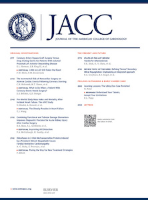
JOURNAL OF THE AMERICAN COLLEGE OF CARDIOLOGY
Exploring the Frontiers of Cardiovascular MedicineJOURNAL OF THE AMERICAN COLLEGE OF CARDIOLOGY, the esteemed publication of Elsevier Science Inc, stands as a premier platform for advancing knowledge in the field of cardiology and cardiovascular medicine. With an impressive impact factor reflecting its prominence—ranked Q1 in its category for 2023 and occupying the 4th position out of 387 in the Scopus listings, firmly placing it in the 99th percentile—this journal is essential for researchers, clinicians, and students alike. Since its inception in 1983, it has continuously provided a vital space for high-quality research and innovative clinical practices, driving forward our understanding of cardiovascular health. While access options are not open, the value of the cutting-edge articles published here cannot be overstated, as they foster collaboration and inform better patient care across the globe. As part of its ongoing commitment to excellence, the journal solicits submissions of original research, reviews, and clinical studies that contribute meaningfully to the field and engage its diverse readership.

Frontiers in Cardiovascular Medicine
Elevating Cardiovascular Research Through Open Access.Frontiers in Cardiovascular Medicine is a leading open-access journal published by FRONTIERS MEDIA SA, dedicated to advancing research in the field of cardiology and cardiovascular medicine. Since its inception in 2014, the journal has become a vital platform for the dissemination of high-quality research, boasting a commendable Q2 rank in the 2023 category for Cardiology and Cardiovascular Medicine. With a focus on promoting innovative studies and clinical insights, Frontiers in Cardiovascular Medicine facilitates open access to its content, allowing researchers, healthcare professionals, and students from around the globe to engage with the latest findings which are critical for the advancement of cardiovascular health. The journal's significant presence in the academic landscape, as indicated by its Scopus ranking (161/387 and 58th percentile), underscores its importance as a research outlet in this essential field. Located in Lausanne, Switzerland, the journal continues to support the global cardiovascular community by encouraging collaboration and knowledge sharing to address the challenges faced in cardiovascular medicine today.
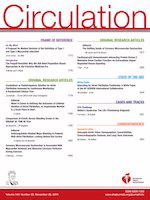
CIRCULATION
Exploring the Frontiers of Cardiovascular Medicine.CIRCULATION is a premier journal in the field of cardiology and cardiovascular medicine, published by Lippincott Williams & Wilkins. With a distinguished history dating back to 1950, the journal has consistently been at the forefront of critical research, showcasing significant advancements and discoveries in cardiovascular health. It holds a remarkable Q1 ranking in both the fields of Cardiology and Physiology (medical) according to the 2023 category quartiles, demonstrating its influential role among the top publications in these disciplines. With an impressive Scopus ranking, placed 3rd out of 387 in Cardiology and 2nd out of 113 in Physiology, CIRCULATION is essential reading for researchers, practitioners, and students passionate about advancing their understanding of heart health and related medical sciences. Although the journal is not open access, it continues to foster scholarly exchange and innovation in cardiovascular research, making it an indispensable resource for quality insights and groundbreaking studies.

Netherlands Heart Journal
Fostering Innovation in Heart Health Through Scholarly DiscourseNetherlands Heart Journal is a premier academic publication dedicated to advancing knowledge in the field of cardiology and cardiovascular medicine. Published by BOHN STAFLEU VAN LOGHUM BV, this journal has established itself as a critical platform for researchers, professionals, and students seeking to explore groundbreaking findings and innovative practices in cardiovascular health. With an ISSN of 1568-5888 and E-ISSN 1876-6250, the journal boasts a respectable Q2 ranking in the Cardiology and Cardiovascular Medicine category, placing it in the top half of its field according to the 2023 quartiles. The Scopus ranking places it 130th out of 387 in the relevant category, indicating a commendable percentile rank of 66th, which attests to its influence and quality of published research. Spanning from 2005 to 2024, the journal endeavors to include a diverse array of topics, encompassing clinical practice, technological innovations, and public health considerations related to cardiovascular diseases. Researchers and practitioners are encouraged to engage with the journal's robust content, contributing to and benefiting from the collaborative effort to enhance cardiovascular health worldwide.
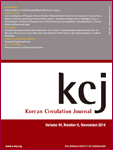
Korean Circulation Journal
Bridging Research and Practice in Cardiology.Korean Circulation Journal, published by the Korean Society of Cardiology, has established itself as a prominent platform for disseminating research in the fields of Cardiology and Cardiovascular Medicine. With an ISSN of 1738-5520 and an E-ISSN of 1738-5555, this journal has been at the forefront of cardiovascular science since its inception in 2006 and is projected to continue until 2024. The journal's commitment to quality is reflected in its 2023 category quartiles, ranking in the second quartile (Q2) for both Cardiology and Internal Medicine, as well as its commendable Scopus rankings within the respective fields. Located in South Korea, the journal aims to bridge the gap between cutting-edge research and practical applications, serving as an invaluable resource for researchers, healthcare professionals, and students keen on advancing their understanding of cardiovascular health. Although currently not an open-access journal, it provides a wealth of knowledge that encourages evidence-based practice in clinical settings.

CANADIAN JOURNAL OF CARDIOLOGY
Leading the Way in Cardiac Health InsightsCanadian Journal of Cardiology (ISSN: 0828-282X, E-ISSN: 1916-7075), published by Elsevier Science Inc, serves as a vital platform for disseminating high-quality research in the dynamic field of cardiology and cardiovascular medicine. Since its inception in 1985, this journal has established itself as a leader in the field, currently holding a prestigious Q1 ranking in Cardiology, indicating its significant impact and contribution to medical science. With a Scopus rank of #50 out of 387 in its category and placing in the 87th percentile, the journal showcases rigorous peer-reviewed articles that advance knowledge and practice in cardiology. Although the journal is not open access, it provides valuable insights and research findings that cater to clinicians, researchers, and students who are committed to improving cardiovascular health. As we approach the convergence of years to 2024, the Canadian Journal of Cardiology continues to strive for excellence, facilitating a discourse vital for both academic and clinical advancements in cardiology.

CURRENT CARDIOLOGY REVIEWS
Advancing Cardiovascular Knowledge for Better OutcomesCURRENT CARDIOLOGY REVIEWS, an esteemed journal published by BENTHAM SCIENCE PUBL LTD, is a pivotal resource in the field of cardiology and cardiovascular medicine. With an ISSN of 1573-403X and E-ISSN of 1875-6557, this journal presents comprehensive reviews that contribute significantly to the advancement of scientific knowledge and clinical practices in cardiology. Operating with open access options, CURRENT CARDIOLOGY REVIEWS is dedicated to bridging the gap between research and practice, thereby encouraging interdisciplinary collaboration and knowledge sharing. The journal has been instrumental in disseminating high-impact findings, consistently maintaining a Q2 category ranking in both Cardiology and Cardiovascular Medicine, as well as within the miscellaneous categories of Medicine, highlighting its relevance and respect in the academic community. Researchers, practitioners, and students alike will find valuable insights into contemporary cardiovascular issues, practices, and innovations that promote better patient outcomes. Based in the United Arab Emirates, CURRENT CARDIOLOGY REVIEWS encourages global contributions and reflects the latest advancements up to the year 2024, solidifying its role as an essential publication for those engaged in the quest for excellence in cardiovascular health.